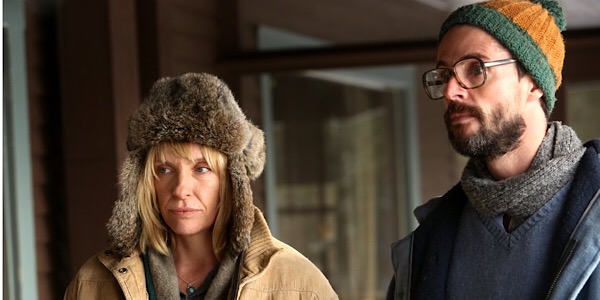In 1978 two scientists, husband Ben (Matthew Goode) and wife Catherine (Toni Collette), propose to peculiar millionaire Gertz (Michael Smiley) the idea of raising children contrarily to their genetic makeup. They would specifically target certain traits that they would then help flourish in the child, and their pitch was that the family genes wouldn’t alter their personalities or hinder any process. It is an experiment of nurture over nature, as they develop their children to these precise outcomes.
Stimulating foundation for a film, yes?

I thought so too, but the hypothesis at hand overshoots. Birthmarked has a premise that is interesting in its intent but lacking in conviction. As the movie started I was intrigued by this from a psychological standpoint, with the continuous debate of nurture over nature, and vice versa. The movie focuses on this experiment, which entails come interesting family dynamics. Regrettably, there is an unbalanced execution.
The Premise: “Could We Have Been Anyone But Who We Are?”
Let’s meet the family.
Their biological son Luke (Jordan Poole) is being groomed to be an artist, which promotes turning his struggles into music, and looking at things differently than his scientifically inclined parents. They also adopt Maya (Megan O’Kelly), who came from a family of simple-minded folks, but is told she’s brilliant, and is taught to be an intellectual. Maurice (Anton Gillis-Adelman), also adopted, came from a gene pool of aggressors and is raised as a pacifist, with meditation as a daily routine.
Throughout the course of the film we’re given details by narration, which is done by Gertz’s assistance Mrs.Tridek (Fionnula Flanagan), who is involved with the project from the beginning. Her voice has an almost whimsical lilt, which makes it a welcomed addition, even if the particulars described aren’t always entertaining.
Their goal proves to be anything but an easy journey, but the parents keep at it, entrusting the help of their sexually repressed Russian assistant/nanny Samsonov (Andreas Apergis). They move to a cabin, seemingly in the middle of nowhere, to ensure focus. We’re given a brief montage as things progress, and the children are raised. When Luke writes a play and his siblings perform in it, which turns out to be a disaster adapted from an issue of Penthouse, things begin to splinter.
After eleven years, Gertz and his team visit, and the progress isn’t what he’s hoping. If things don’t turn around, they’ll be forced to repay all the money they’ve received. This drives a wedge in the family, as the kids begin to rebel, and the parents paths begin to diverge. Ben is committed to the cause, even if it threatens to derail his life, while Catherine becomes mentally drained by the endeavor.
Promise Becomes Inconsistency
The film yearns to be a Wes Anderson movie, with its narration, off the wall characters and quirky humor. However, it is unable to master the charm and attention to detail that Anderson can so easily capture. A lot of the jokes incur a silent reception, and the family aspects don’t quite jive. When one genre element flourishes, the other flails, keeping the keel unfortunately unkempt. There is a lot of uncertainty in Emanuel Hoss-Desmarais direction, which made the aspects that did work seem slighted.
As the couple continues to split, the always wonderful Toni Collette is efficient in her fragmentation, and Matthew Goode in his keen ignorance. As performances go, both take what they are given with gusto, there just isn’t much from which to work. With the impressive talent involved, the downfall of the promising start makes it that much harder to take.
The emphasis on the discourse of this dysfunctional family, as it specifically highlights the difficulties of child-rearing, are worth watching. There is also a reflection on the emotional glue that binds the group, in the final act, that is predictable but forgiving. Overall though, Birthmarked is a tepid affair. This is one of those cases where I really wanted to like the finished product, but it just didn’t work out.
For all it’s worth, the film is about scientists who force things on their unbeknownst children, all in the name of research. Is it worth it? Where is the line, and when is it crossed? Yes, sentimentality eventually steps in, and the heart of a family (which had been surgically removed prior) does begin to beat. It just isn’t enough.
Conclusion: Birthmarked
Along with the satirical approach there is also a semblance of truth to the formula: parenting isn’t easy, and things hardly ever go as planned. If the characters had been more likable, perhaps the picture would have been too. Neither the children nor the main couple are particularly enthralling, and the talent can’t save the weakness of Marc Tulin’s and Emanuel Hoss-Desmarais’s story. For the most part, it seemed Birthmarked couldn’t quite figure out its own identity. Maybe that was the point, and maybe this story could have used more nurturing itself.
What did you think? Did Birthmarked win you over in the end? Let us know in the comments below!
Birthmarked was released in the US on March 30th and is also available on demand. For more release date information click here:
Does content like this matter to you?
Become a Member and support film journalism. Unlock access to all of Film Inquiry`s great articles. Join a community of like-minded readers who are passionate about cinema - get access to our private members Network, give back to independent filmmakers, and more.